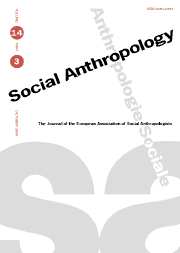Social anthropology. Towards a pragmatic enlightenment?
Published online by Cambridge University Press: 03 June 2005
Abstract
After a couple of decades of post-modernist debate, time is ripe to reassess the unity of anthropology as a distinct field of knowledge. Many disciplines study culture and quite a few have embraced ‘ethnography’ and fieldwork. The distinction of anthropology is not, therefore, implied simply by a particular object of study (society or culture) or by a particular method (fieldwork). I shall argue that the distinction derives from a particular way of relating to the object and pertaining to both the relations in the field, and the way in which these relations infuse the resulting knowledge. By tracing the development of anthropology through various ‘turns’ and delineating the contours of a particular mode of anthropological attention, the article makes a case for the vitality and pertinence of the anthropological field, which it owes to the power of bringing the ethnographic and the epistemological into coincident view.
Après une vingtaine d'années de débat post-moderniste, le temps est venu de réexaminer l'unité de l'anthropologie en tant que champ de connaissance distinct. De nombreuses disciplines étudient la culture, et un certain nombre ont adopté ‘l'ethnographie’ et le travail de terrain. La distinction de l'anthropologie ne découle donc pas d'un objet d'étude particulier (la société ou la culture) ou d'une méthode particulière (le travail de terrain). Je soutiendrai que la distinction dérive d'une façon particulière d'appréhender son objet, et des relations dans le travail de terrain et de la manière dont ces relations infusent les savoirs qui en résultent. En retraçant les développements de l'anthropologie à travers plusieurs ‘tournants’ et en délimitant les contours d'un mode particulier de l'attention anthropologique, l'article établi le bien-fondé de la vitalité et de la pertinence du champ anthropologique, qu'il doit au pouvoir qu'il a de faire coïncider l'ethnographique et l'épistémologique.
Nach einigen Jahrzehnten postmodernistischer Debatten, ist es an der Zeit, die Einheitlichkeit der Anthropologie als akademische Disziplin und als abgegrenztes Wissensfeld neu zu betrachten. Viele wissenschaftliche Disziplinen erforschen Kultur und einige davon umfassen auch ‘Ethnographie’ und Feldforschung. Die Eigenheit der Anthropologie als Fach ist nicht simpel weg in ihrem Studienobjekt (einer Gesellschaft oder Kultur) oder in ihrer spezifischen Methode (der Feldforschung) verankert. Ich werde erörtern, wie sie sich in ihrer besonderen Beziehung zum Studienobjekt von anderen Wissenschaftsdisziplinen unterscheidet. Diese besondere Position dem Objekt gegenüber manifestiert sich in den Feldbeziehungen als auch in der Art, wie diese Einfluss auf das resultierende Wissen ausübt. Im Nachgehen der Entwicklung der Anthropologie mit ihren verschiedenen ‘turns’ (Wenden) und im Hervorheben der Konturen einer für das Fach besonderen Betrachtungsweise demonstriert der Artikel die Vitalität und Relevanz des anthropologischen Wissenschaftsfeldes. Diese beruhen auf der Fähigkeit, ethnographische und epistemologische Aspekte in eine übereinstimmende Betrachtungsweise zusammenzuführen.
Luego de un par de décadas de debate post-modernista, ha llegado el tiempo de reevaluar la especificidad de la antropología como un espacio de conocimiento autónomo. Muchas disciplinas se encargan ahora de estudiar la cultura y otras tantas hacen ‘etnografía’ e investigación de campo. Lo que distingue a la antropología no es, por lo tanto, simplemente un objeto de estudio particular (sociedad o cultura) o un método específico (la investigación de campo). Lo que distingue a la antropología es una manera particular de acercarse a su objeto, la composición de relaciones durante la investigación, y la manera en la que estas relaciones influyen en los resultados. Al rastrear el desarrollo de la antropología por medio de sus diferentes ‘derroteros’, y al delinear los límites del modo particular de atención antropológica, este artículo pone de manifiesto la vitalidad y pertinencia del campo antropológico, la cual se debe al introducir lo etnográfico y lo epiostemológico a la vez.
- Type
- Research Article
- Information
- Copyright
- © Cambridge University Press 2005
Footnotes
- 24
- Cited by


